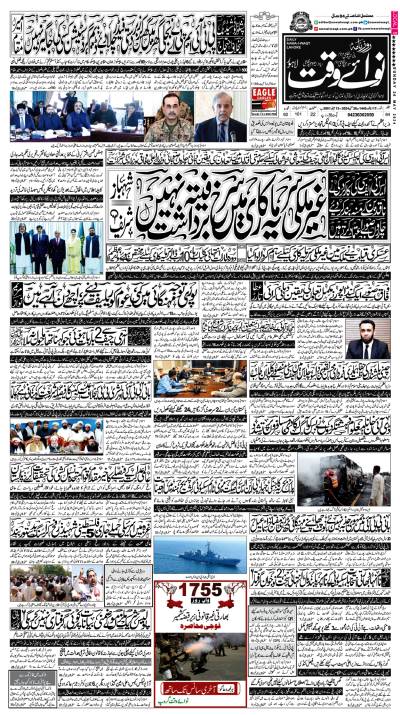LAHORE - Abdul Hafeez Pirzada, who pegged out on Tuesday, was the last of the six politicians who had held abortive talks to resolve the crisis that gripped the country immediately after the controversial elections of 1977.
Under the leadership of then prime minister Zulfikar Ali Bhutto, Mr Pirzada and Maulana Kausar Niazi represented the government, while Mufti Mehmud (the father of Maulana Fazlur Rehman), Nawabzada Nasrullah Khan and Professor Ghafoor Ahmed represented the Pakistan National Alliance, a conglomerate of opposition parties.
Despite their efforts to agree to a solution, martial law was imposed on July 5, 1977, which subsequently led to the execution of Mr Bhutto on April 4, 1979.
Mr Pirzada, being a part of the government’s negotiating team, knew well which leader had played what role in delaying an agreement which had provided the military a justification to take over.
One of the most prominent lawyers, Mr Pirzada will also be remembered for the role he played along with other parties and leaders in framing the 1973 Constitution. People of all shades of opinion agree that this Constitution is holding the country together. It was certainly the best document that could satisfy all federating units. But the unrest seen in subsequent years was the result of the government’s failure to adhere to it.
In this Constitution Article 6 had been incorporated to ward off the possibility of imposition of martial law for good. It provided for capital punishment to anyone who topples a democratic setup and imposes martial law. But in less than four years the political government was overthrown by Gen Ziaul Haq. The judiciary validated the intervention, against the expectations of all the framers of the Constitution.
In the light of the bitter experience of 1977, the political parties introduced the 18th amendment during the 2008-2013 PPP rule, which made it rather more difficult for anyone to subvert the Constitution.
Mr Abdul Hafeez Pirzada was among the founding members of the PPP. He was one of the trusted lieutenants of Mr Bhutto. It was because of this trust that Mr Bhutto made him the minister for law, education and even finance. Handsome and brilliant, Mr Pirazda impressed Mr Bhutto to an extent that he lovingly called him “Sohna Munda” (handsome boy).
The opposition was on the streets as a protest against the rigging in the 1977 elections. All parties were demanding fresh elections as they believed that free and fair polls would marginalize the PPP. Till then the government was in no mood to give in.
In such a situation, Mr Bhutto addressed a news conference at the Governor’s House, Lahore.
An Australian journalist asked Mr Bhutto what was the justification for the opposition’s protest against the prime minister when under the Constitution it was the president who could call fresh elections.
“Pirzada, give this journalist a copy of the Australian Constitution”, said Mr Bhutto while turning to the talented “Sohna Munda” who was present on the occasion. “Allow me to read out the relevant article of the Australian Constitution”, came a prompt reply from Mr Pirzada.
The episode established that both Mr Bhutto and Mr Pirzada were aware of the similarities of the Constitutions of Pakistan and Australia and they wanted to answer the question in the light of the Australian Constitution.
The overthrow of the PPP government and the execution of Mr Bhutto disappointed Mr Pirzada to an extent that he started thinking of saying goodbye to politics. However, for some time he remained part of the Sindh, Baloch, Pushtoon Front, a body launched to call for making Pakistan a confederation. Mr Mumtaz Ali Bhutto was another important leader of the SBPF. The two Sindhi leaders, however, failed to get public support for their programme, after which they disbanded the SBPF and started supporting Pakistan as a federation.
For more than two decades, Mr Pirzada focused on his legal profession. He said in an interview to a TV that he earned between Rs 120 million and 130 million per year.
The last case he argued was the PTI’s objections against the 2013 elections. Though the judicial commission headed by then CJP in its final report held that the elections were valid, a number of flaws in the electoral process were pointed out by Mr Pirzada and some other lawyers. It is being hoped that the electoral system would be reformed in the light of the flaws pointed out during the 84-day proceedings. Many say that the next elections would be much better than all previous elections. He argued a number of other important cases before the superior courts because of which he would always be remembered by those associated with the legal profession.
Sunday, May 26, 2024
‘Sohna Munda’ played his innings well
Petrol prices likely to drop further from June 1
9:55 PM | May 26, 2024
Mercury soars to 50 Celsius in five districts of Sindh and Punjab
3:41 PM | May 26, 2024
PTI leader Dr. Yasmin Rashid discharged from hospital
3:31 PM | May 26, 2024
Pakistan Sports Festival concluded
2:01 PM | May 26, 2024
PM reaffirms Pakistan's commitment to 'One China' policy
1:14 PM | May 26, 2024
Taiwan Escalation
May 26, 2024
Salaries & Pensions
May 26, 2024
Controlling Mobs
May 26, 2024
An Effective Registry
May 25, 2024
Economic Respite
May 25, 2024
History’s Biggest Fraud
May 26, 2024
Self-Medication
May 26, 2024
A Call for Reform
May 26, 2024
Natural Resources in Balochistan
May 25, 2024
Tribal Disputes
May 25, 2024
ePaper - Nawaiwaqt
Advertisement
Nawaiwaqt Group | Copyright © 2024





